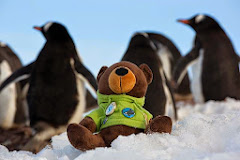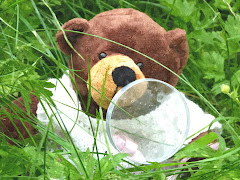Today we took a little bit of Shoreham Beach to Davison
CE High Schools for Girls for the E.Y.E summit. E.Y.E Stands for Eco Young and
Engaged – The E.Y.E. Project was established in 2008 by Tim Loughton, M.P. for
East Worthing and Adur.
The Project aims to raise sustainability awareness and
encourage young people’s interest in the environment. It provides an additional
opportunity for the young people within those schools to learn about
environmental matters through fun and educational activities available at our
Eco-Summit events across West Sussex.
I took along my display stand that looks at
Shoreham as part of the global ocean and focused on the benefits we get from
the ocean such as 50% of the oxygen we breathe. The display also explained why
Shoreham Beach is special.
Bella was also there too with her message about water and her travels to the Amazon and Madagascar.
The theme of the event this year was sustainability
and so we ran three workshops exploring plastic and considering if as invaluable
to modern society or if it is an environmental scourge.
I started the workshop with the children suggesting things that
were made of plastic and if this was a good or bad use of plastic and why.
To help understand how we have reached our current
use of plastic, we explored how and why plastic was originally invented and how
it was inspired by the amazing abilities and limitations of rubber. We looked
at early plastics – such as celluloid – without which we would not have had a
film industry at that time, which linked to the early film making at Shoreham.
We
looked at Bakerlite which paved the way for modern plastics
I encouraged children to think of ways that the invention
of plastic may have helped the environment – for example it greatly reduced our
reliance on wood and reduced cutting down of woodland and rainforest).
We then discussed environmental problems from
plastic, looking at terrestrial examples as well as marine. The children then
took part in the Albatross game – which explores how albatross adults in Hawaiian
Islands collect food (and accidentally plastic and other man-made items) which
they feed to their chick. Explore plastic pollution threat to wildlife and the
environment.
As albatross
parents they will collect food for their chick. This will involve one child at
a time picking up a card (face down) to reveal a plastic item or food item to
feed their chick. Each child (albatross) will collect several cards and then we
discussed the fate of their albatross chick.
Some collected just food items,
some collected food items and small pieces of plastic some, a few collected
food but also large items such as a tooth brush or disposable lighter. Will
their chick survive? I then gave the children one last piece of information,
just before it fledges the albatross chick will regurgitate a bolus of undigested
food items such as squid beaks, fish scales etc and the bolus may include small
bits of plastic, bottle tops etc.
The children then reconsidered the fate of
their chick based on this.
We then looked at micro plastics with the help of a
micros plastic activity and then discussed sources such as photo-degraded
plastic, micro-beads and nylon threads from our clothes.
Consider if modern society can exist without
plastic and discuss ideas of how society/we can help reduce the plastic debris
problem.
We finished by looking at possible replacements for
plastic such as bio-plastics made from natural materials – this included a
possible new plastic made from the shells of shrimps and prawns that are
currently discarded each year as part of seafood processing.
We then discussed
ways that we can help with the current problem by choosing carefully what we
buy, by reusing and recycling.
It was a great day and the children were very excited and keen to apply what they had learned to their own school or at home.
It was an amazing day.





















